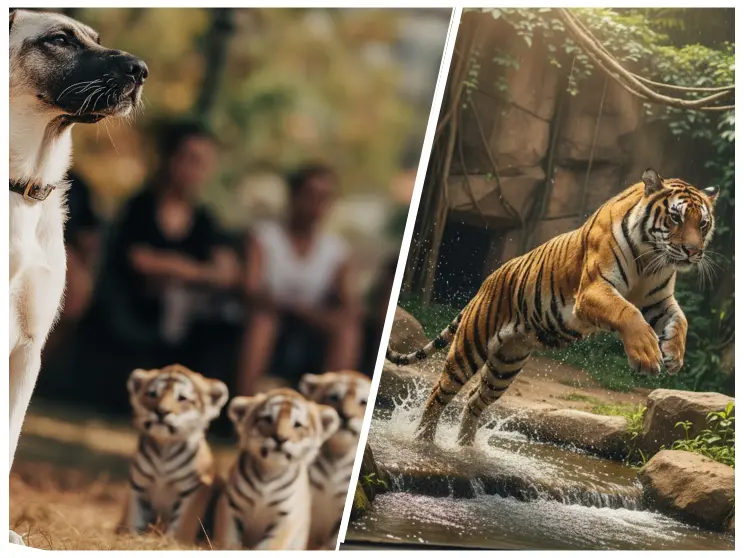Zachary thought he had seen everything in his years at the zoo, but one chapter changed everything. It began with Daisy, a gentle dog. What unfolded around her drew whispers, divided staff, and soon made the zoo the only story people wanted to discuss.
Crowds grew, reporters circled, and debates raged in breakrooms about safety, instinct, and the thin line between love and danger. Zachary lived at the center of it, every decision heavy with consequence. Some hailed the story a miracle, while others feared an impending tragedy.
Years later, when the final moment came, the entire enclosure fell into a silence so heavy it felt unnatural. Onlookers stopped breathing, keepers braced for catastrophe. Something happened then—something no one could fully explain…
Zachary moved through the zoo before dawn, the world still half asleep. He preferred these hours, when cages hushed with the breath of the resting animals. He always felt responsible for the comfort of every inmate. On one such morning, a rustle near the trash bins startled him. It was a creature, small, wiry, and alive.

At first, he thought, raccoon. But then he saw a pair of lifted amber eyes, hesitant yet defiant. It was a dog—thin, ribs showing, and fur matted. A stray. She froze, waiting for him to shout or throw something. Instead, Zachary crouched, extending a gloved hand. She didn’t run. That she trusted him so readily surprised him.
The zoo had some clear rules: strays didn’t belong. But as the dog edged forward, sniffing, Zachary knew he was about to break that rule. From his pocket, he pulled a crust of bread meant for his own lunch. For a dog so obviously hungry, she never grabbed, just took it from him gently. In that moment, Zachary knew that she was a keeper.
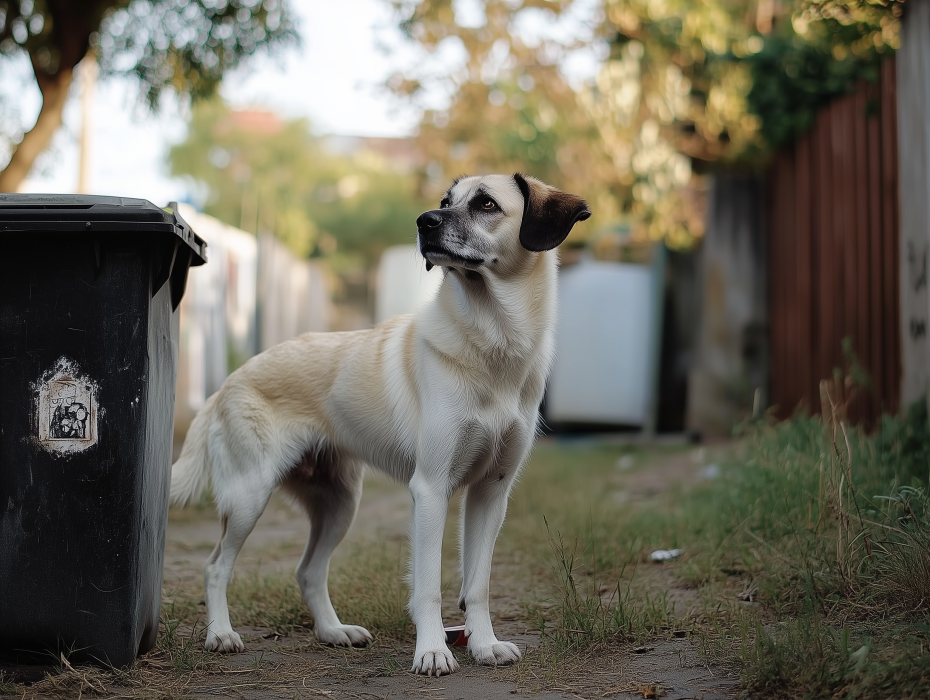
Day after day, she appeared near the staff entrance, tail curled low but wagging faintly. He began saving scraps, sometimes an entire sandwich. Soon she shadowed him on his rounds, slipping between shadows of enclosures. The zoo became hers, unofficially. No one, except a few animals, noticed, and they wouldn’t tell.
Zachary named her Daisy. A simple name, befitting her gentle, quiet nature. Daisy learned his pace, his patterns, and the quiet patience with which he worked. She never barked or flinched at the bigger animals. She watched with her grave eyes. Sometimes, he swore she understood more than people gave animals credit for.
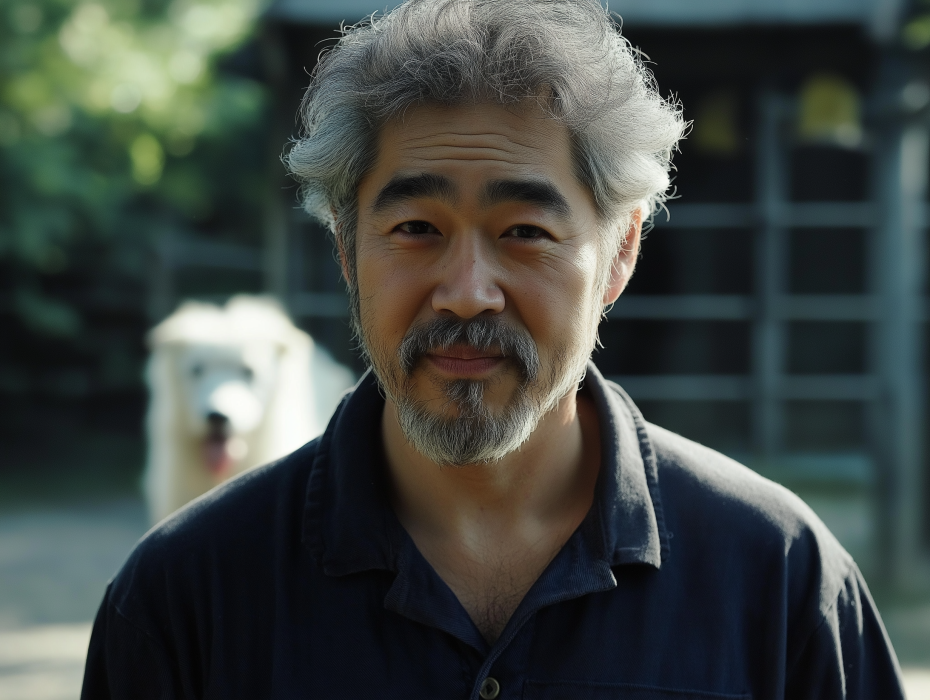
Other keepers teased him. “Got yourself a sidekick?” they’d laugh. Zachary shrugged, pretending indifference. Inside, he cherished the companionship. Daisy was the perfect partner. She simply followed, loyal in a way he couldn’t describe. After closing, he sometimes lingered just for her company.
Daisy was background to the tigers roaring, parrots squawking, and visitors with cameras. Yet Zachary found himself watching her more than the exhibits. She had a way of tilting her head at him, as though weighing his very soul. That gaze unsettled him. It was comfort and challenge combined.
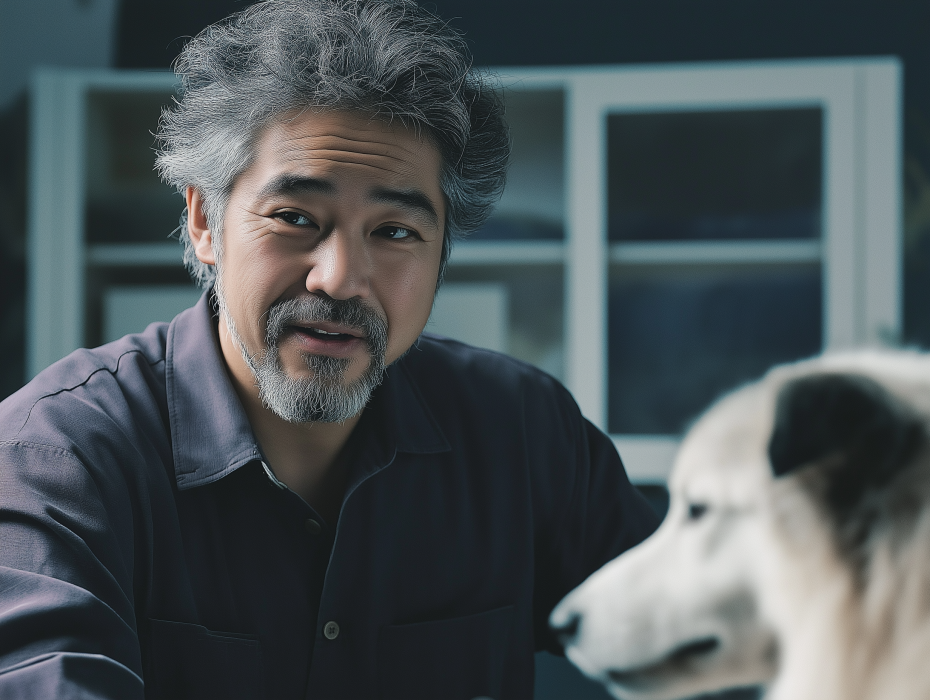
He started confiding in her. Ridiculous, he knew. But when nights pressed heavily, paperwork stacked, and managers complained, Daisy listened. He told her about his loneliness and years spent caged in routine. Sometimes she even nudged his leg, as though validating his feelings and offering solace.
One rainy morning, while Zachary repaired the aviary netting, Daisy pressed herself against his boots, trembling. A storm rattled the sky, and lightning crackled. Other animals shrieked. But Daisy remained silent, clinging to him. That was when Zachary realized she trusted him more than the world beyond the fence.
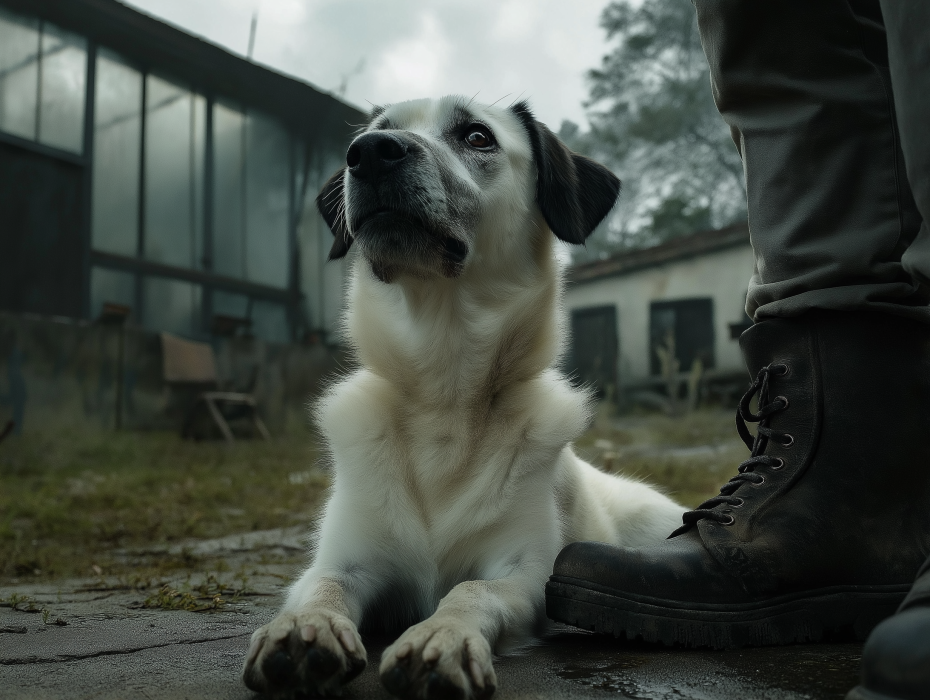
Slowly, Daisy became a part of his life. The pet, who had chosen him. He made a small place for her in his modest quarters, ensuring that she would no longer have to roam the streets. She slowly gained weight, and her fur became glossy. Daisy became his faithful companion.
One stormy night, the tigress went into labor, and Zachary stood by with clenched fists as the vets worked. By dawn, three fragile cubs lay in a bundle of striped fur. The relief was sharp, but it shattered moments later. The mother did not survive, her body unmoving despite every attempt.
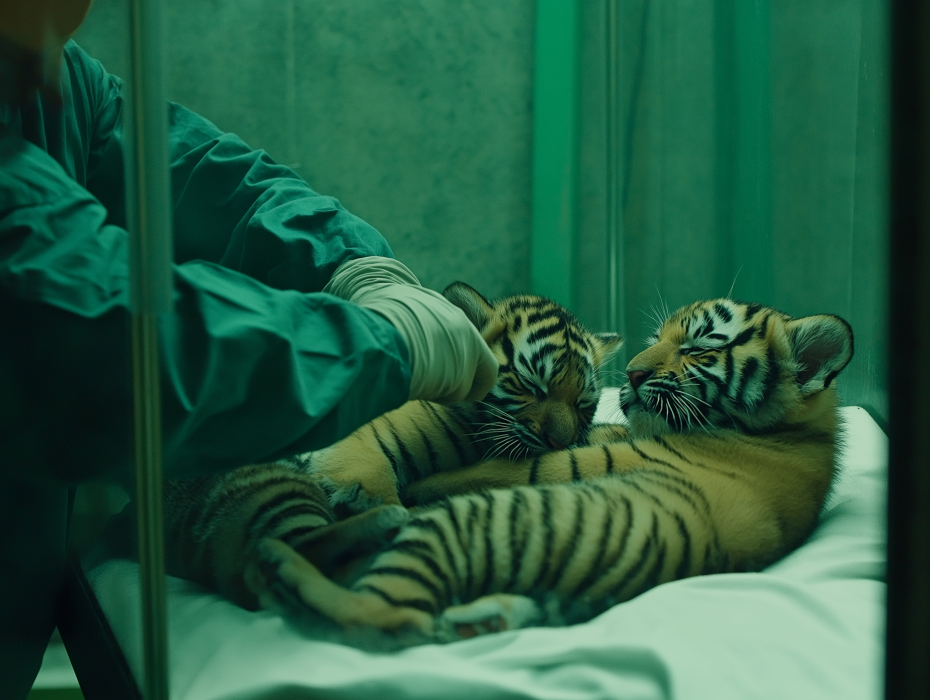
A heavy silence spread through the corridors. Newborn tigers rarely survive without their mother. Zachary knew it, so did everyone else. They were too delicate, too dependent, and the staff’s hands were clumsy substitutes for nature’s design. He leaned against the cold glass, watching tiny chests rise and fall, already fearing the worst.
Meetings followed. Heated voices rose in the cramped office. Cubs could be hand-reared, but it was risky. Even if formula feed worked, newborns needed the love and warmth of a mother. Arguments about ethics and feasibility blurred into one another. Zachary sat quietly, his mind busy with the problem. Was there something he could do?
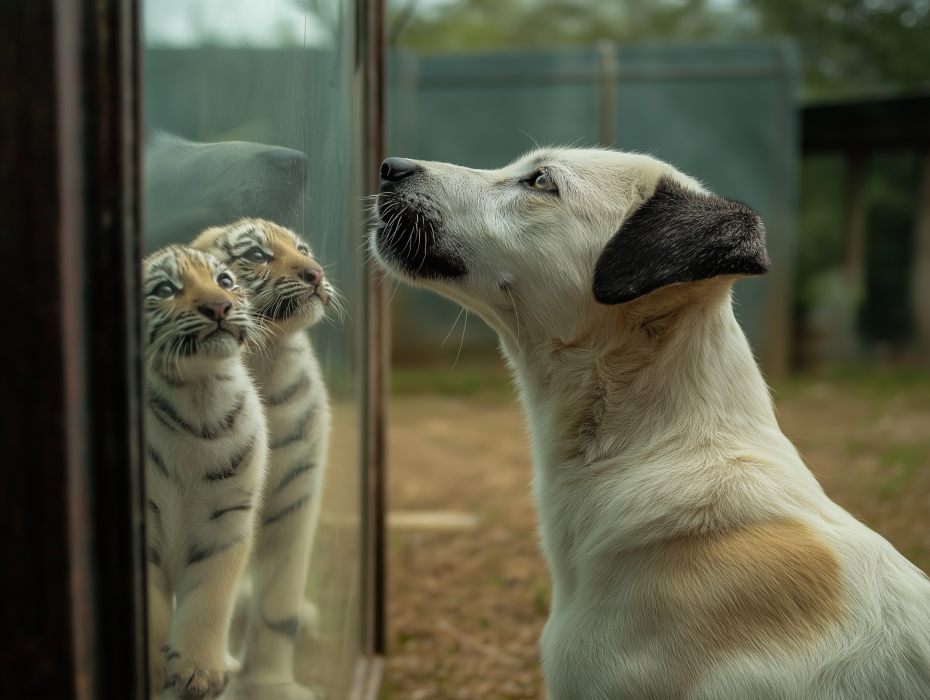
That night, it was Zachary’s task to feed the cubs. For the first couple of days, they needed to be fed around the clock, every two hours. As he finished his work and came out, he saw Daisy, her intelligent eyes fixed on the cubs, pressing her nose against the glass of the enclosure.
On a whim, Zachary unlocked the service gate and brought Daisy near the nursery. He knew this wasn’t protocol and that he could even be fired if something went wrong. Still, something about Daisy’s manner inspired trust. At first, she only sniffed, ears pricked, and body stiff.
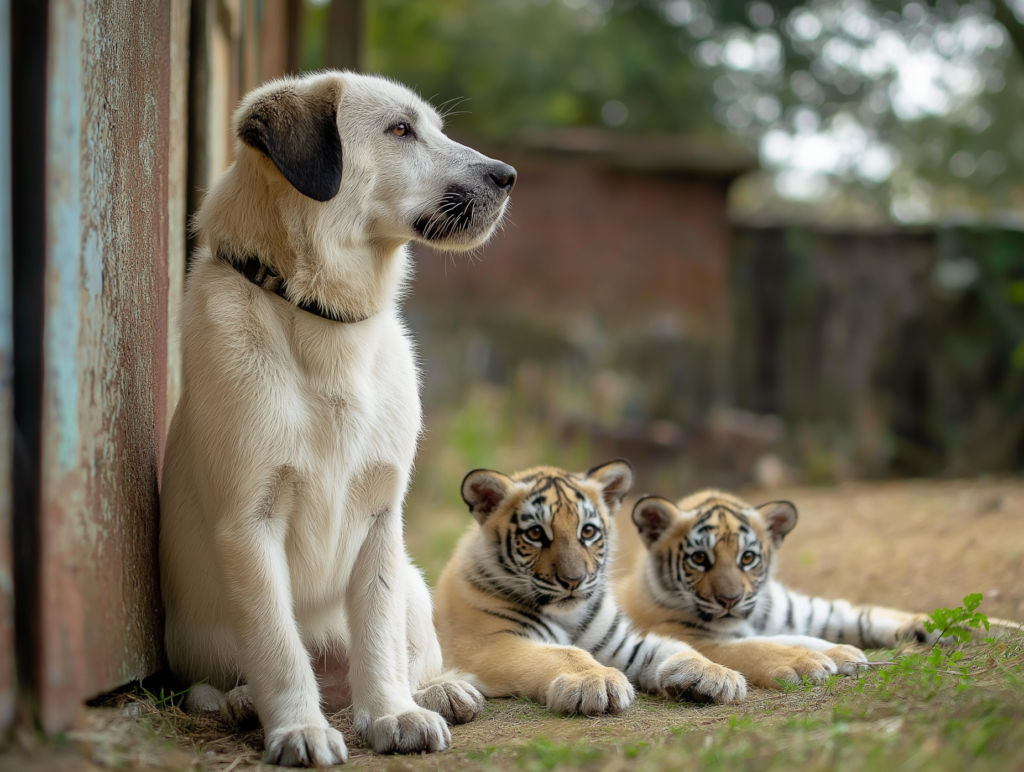
When one cub whimpered, Daisy whined softly in return. That the animals were communicating was evident enough. Against every rule, Zachary held his breath and let her closer. What happened next stole it entirely.
Daisy lay down, calm, steady. The cubs crawled toward her instinctively, pressing tiny heads against her warmth. One found her belly and latched. Another tucked against her chest, listening to her heartbeat. Zachary sank into a chair, amazed and spellbound. Nature was rewriting its script right before him.
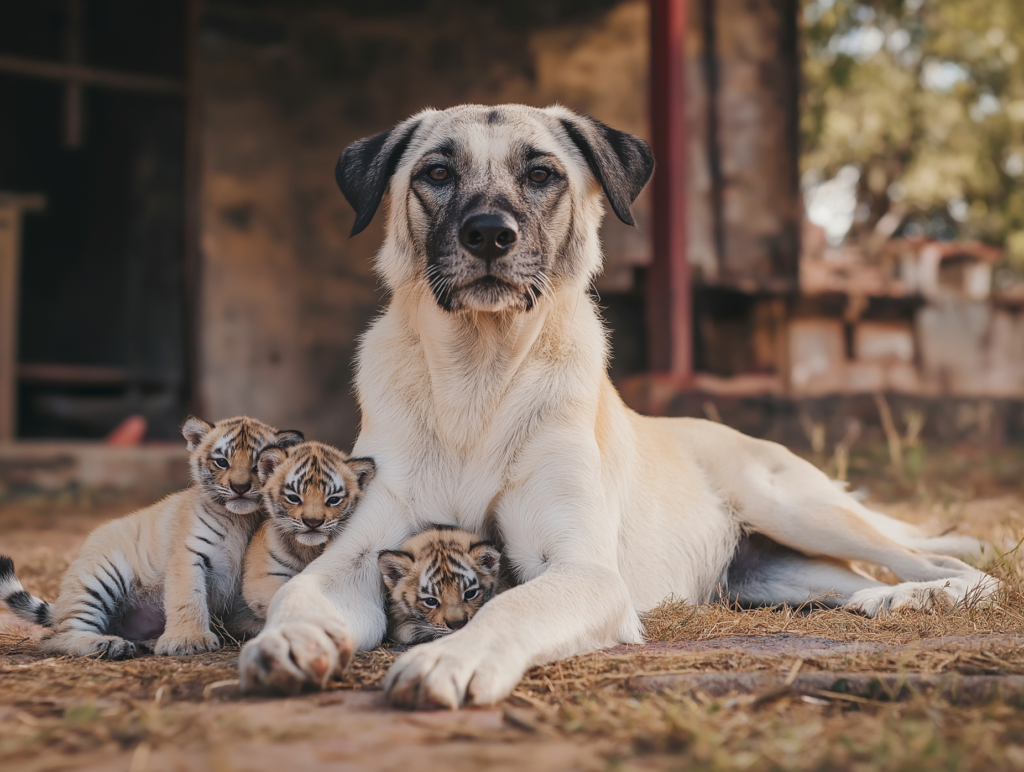
Every time it was his turn to feed the cubs, he let Daisy meet and mother them. Soon, the tiger cubs came to trust her entirely. Zachary was glad to have trusted his instincts. But the larger question remained—would the director and staff agree to this strange arrangement?
One afternoon, Zachary found Daisy curled in straw while the cubs tumbled over her ears. They pawed her muzzle, biting clumsily, and she huffed in mock annoyance. With a sharp bark, she rolled them onto their backs. For a moment, the nursery seemed less like a place of survival and more like a playground.
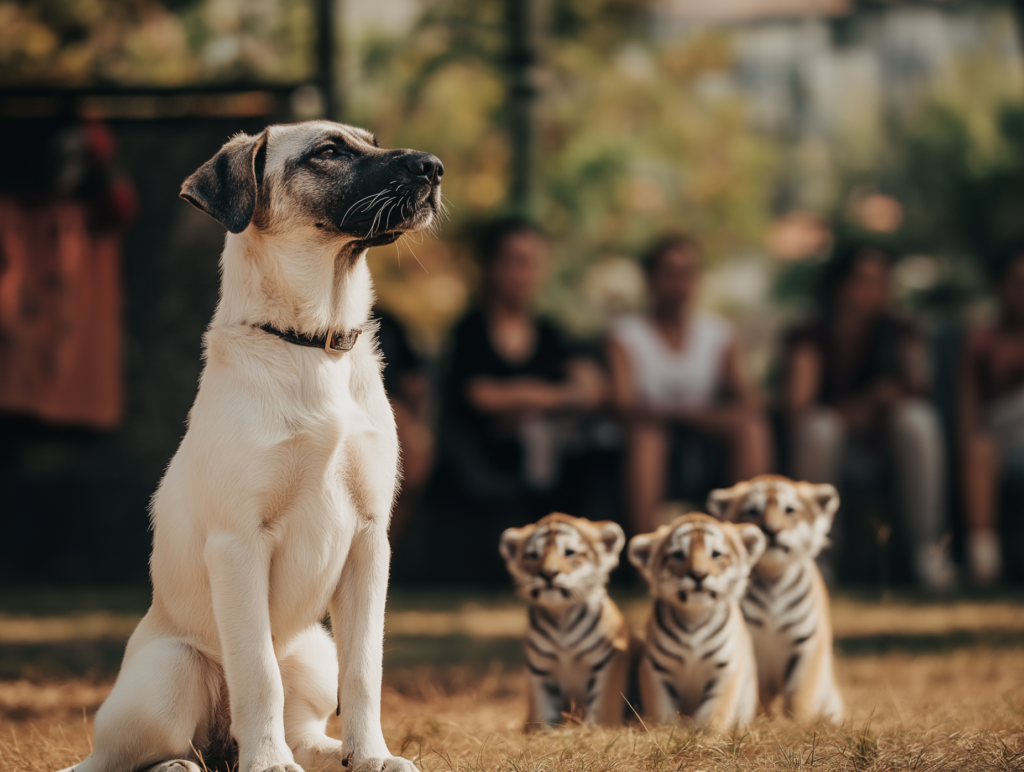
Another day, Daisy trotted proudly across the floor, tail high. The cubs followed in a wobbly parade, stripes blurring as they scrambled after her. Visitors pressed to the glass, gasping at the sight. Zachary laughed quietly, calling it her “royal procession.” Daisy only glanced back once, as if to count them.
Bath time became a spectacle. Daisy licked their ears while they squirmed and squealed, paws pushing against her nose. One cub tried to lick her back, tiny tongue flicking clumsily at her fur. She froze, then leaned into it, eyes half-closed. Zachary scribbled in his notebook, his hands shaking with awe.
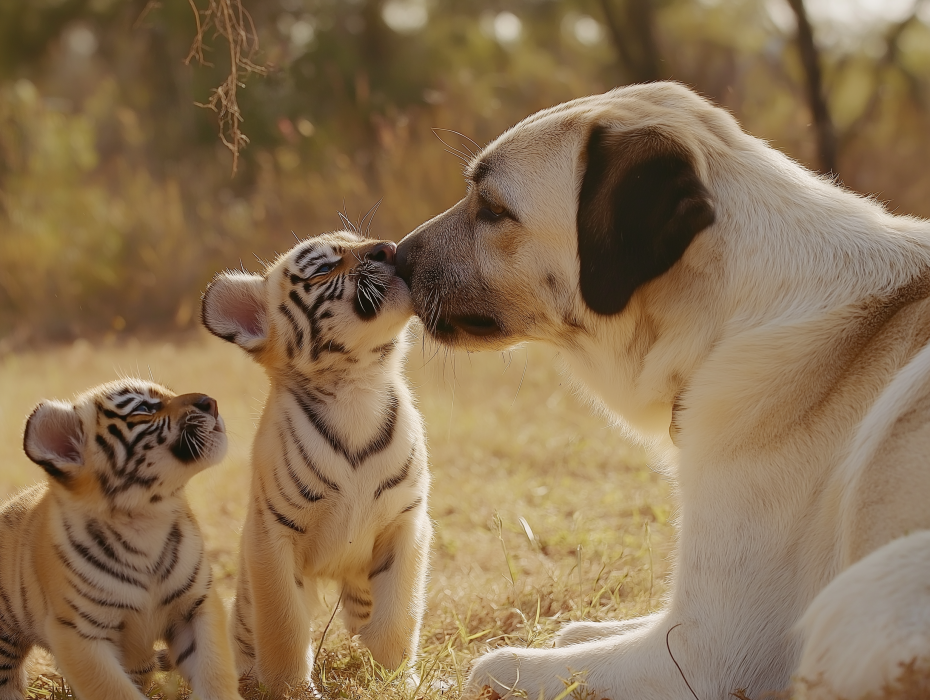
The cubs discovered Daisy’s tail soon enough. They pounced, tumbling in a striped heap, chewing at the wagging prize. Daisy endured until one bite pinched too hard. With a sharp bark, she spun and pinned them down gently. Their squeaks turned into purr-like rumbles, the sound vibrating in Zachary’s chest.
The staunchest sceptics were won over when they saw them together. Daisy groomed the cubs as if they’d been hers all along. Staff stared through the glass, expressions torn between awe and alarm. Some called it miraculous. Others muttered about headlines and lawsuits. Zachary said nothing. He only watched Daisy’s steady devotion, pulse hammering.
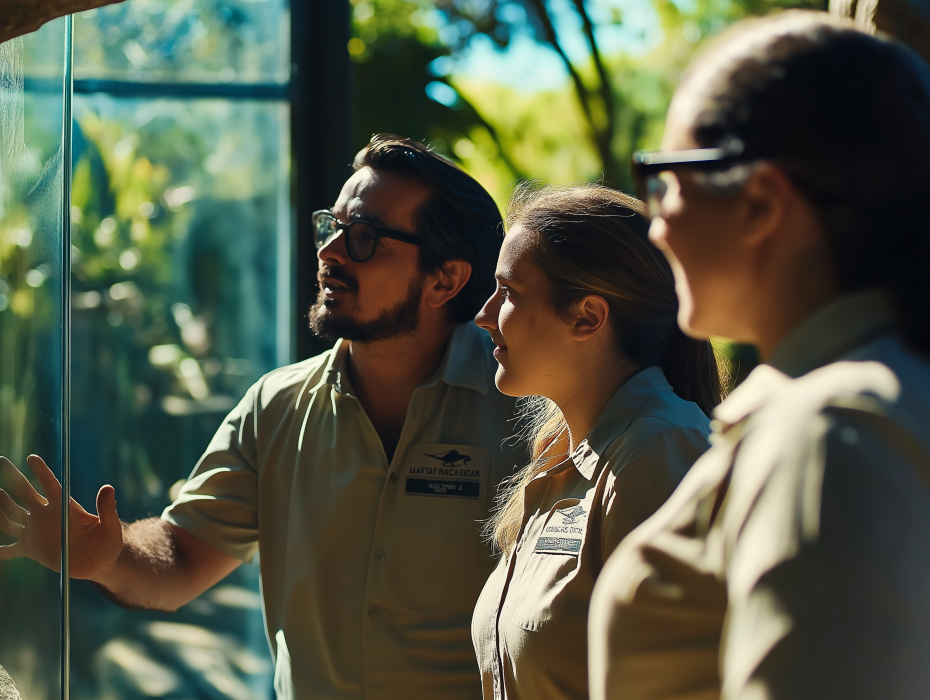
Days blurred into weeks. The cubs thrived, stronger with each sunrise. Daisy was tireless, nudging them back when play grew rough, licking their eyes clean, curling around them at night. Zachary logged every detail in his notebook, though words never captured the weight of what he witnessed. It felt sacred.
Visitors soon learned of the spectacle. Lines doubled at the gates, children pressing noses to glass, parents whispering in disbelief. “A dog raising tigers,” they murmured, snapping photos. The zoo director was pleased with the frenzy, though he muttered about “liability.” Zachary kept his focus on Daisy, certain no one understood the stakes better than her.
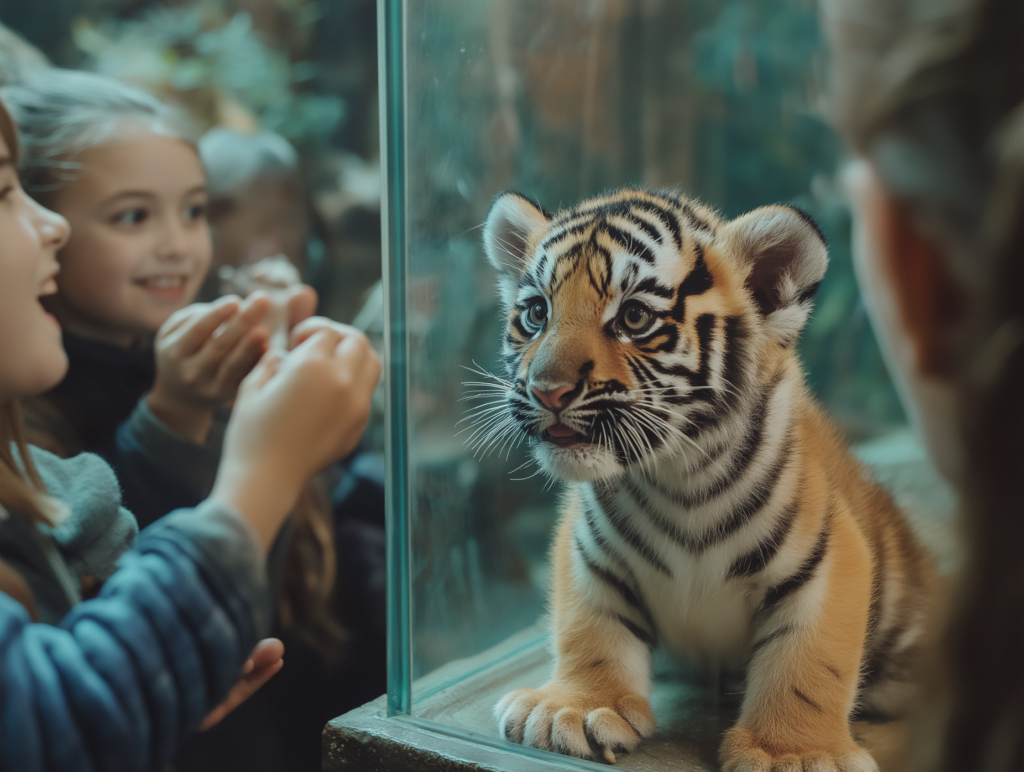
As more people celebrated, there was also unease among staff. Whispers about instinct breaking through flew about. Quiet bets were placed on when things would turn bloody. Zachary carried their doubts home, each one settling heavy in his chest. He trusted Daisy, but trust wasn’t an armor against every eventuality. Someday, something could snap.
Still, each time Daisy padded across the floor with the cubs tumbling after, Zachary felt hope bloom against his dread. She was disproving the rules of most animal manuals. A dog was raising cubs! Yet beneath that fragile miracle lay a ticking clock he couldn’t ignore. Nature was patient, but not always merciful. The question he had to answer was—when?
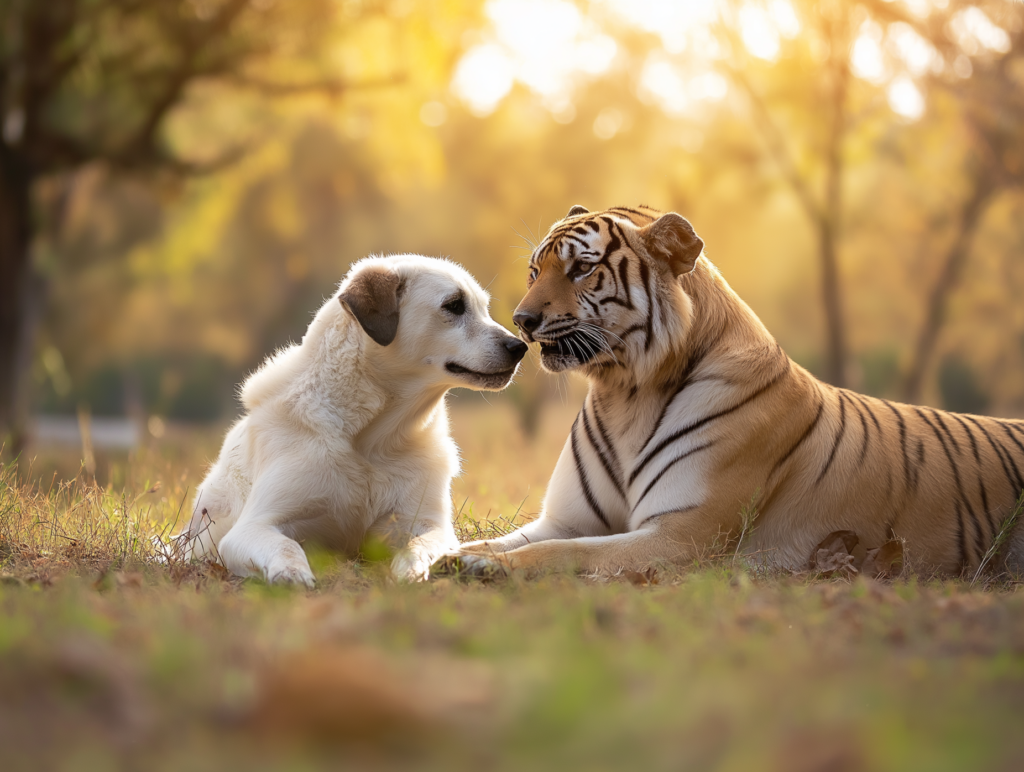
Soon, the cubs no longer fit beneath Daisy’s frame. Their paws, once clumsy, carried strength that at times frightened Zachary. He watched them stalk each other across the straw, pouncing with startling speed. Daisy corrected them with gentle snaps, but her size was laughable beside theirs. A misstep could mean disaster.
During feeding, Zachary noticed the change the most. Meat deliveries once meant playful bouncing, but now low growls rumbled in their throats. Daisy pushed her muzzle in anyway, nudging them aside, claiming her right to feed first. Miraculously, they yielded. Staff behind glass grew alarmed—how long would it take for instinct to shatter this illusion?
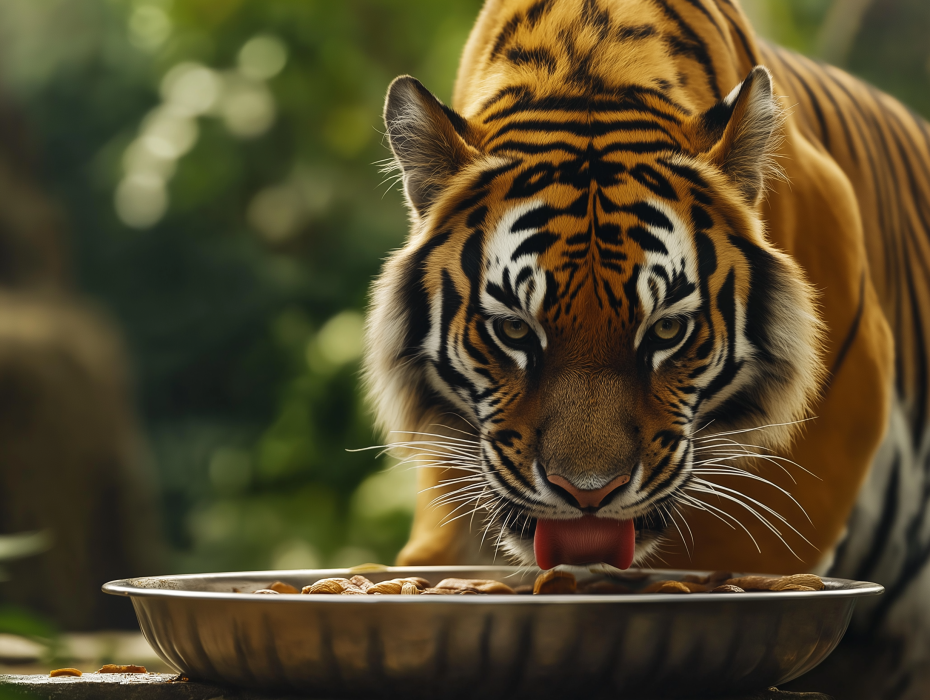
Visitors saw only charm. Children laughed when the cubs chased Daisy’s tail, their stripes blurring into flames. Parents cooed about family bonds transcending species. But Zachary noticed the flashes of feral instinct: claws digging deeper, and bites lingering longer. He forced smiles at visitors, even as dread pooled in his stomach.
One afternoon, a paw swipe knocked Daisy flat. Zachary bolted toward the barrier, heart clanging. But Daisy sprang up, shaking herself, barking sharply. The cub froze, head lowered, almost apologetic. Relief washed him dizzy, but it left him trembling. The staff’s stares told him what he already knew—the time was coming.
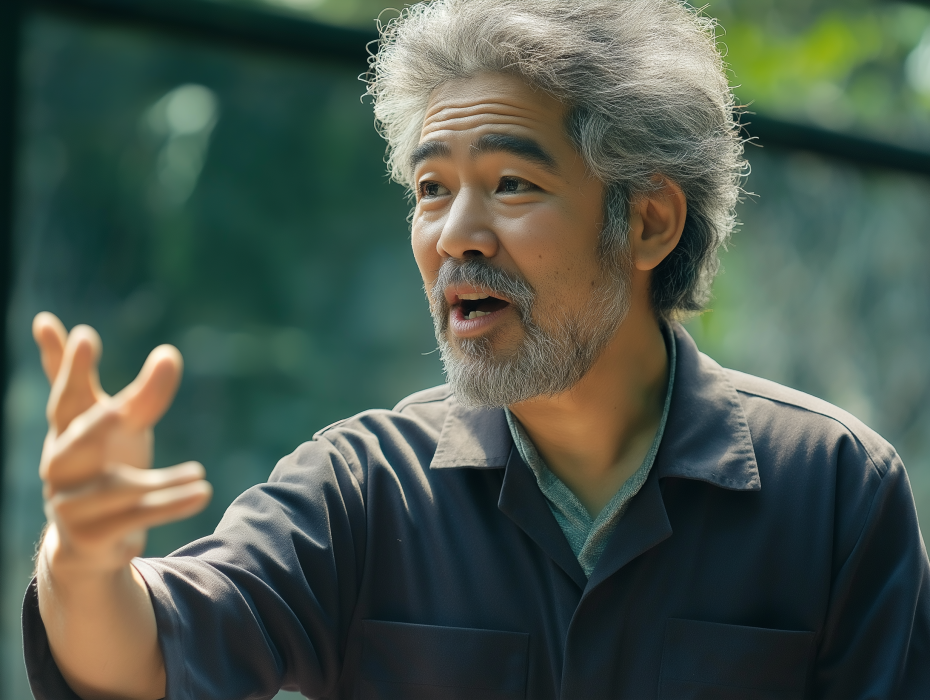
Staff meetings grew harsher. “She’ll end up torn apart,” one insisted. “You’re gambling with lives,” another snapped. Zachary clenched his jaw, unwilling to argue yet unable to surrender. At night, he replayed every moment, listening for cracks in Daisy’s magic. If tragedy came, would it be his fault alone?
The director demanded contingency plans. Reinforced enclosures. Emergency protocols. Zachary’s pulse roared in his ears, and Daisy’s image flashed in his mind—her trust, her unshakable care. He swore quietly to himself he’d fight until the very last for her sake.
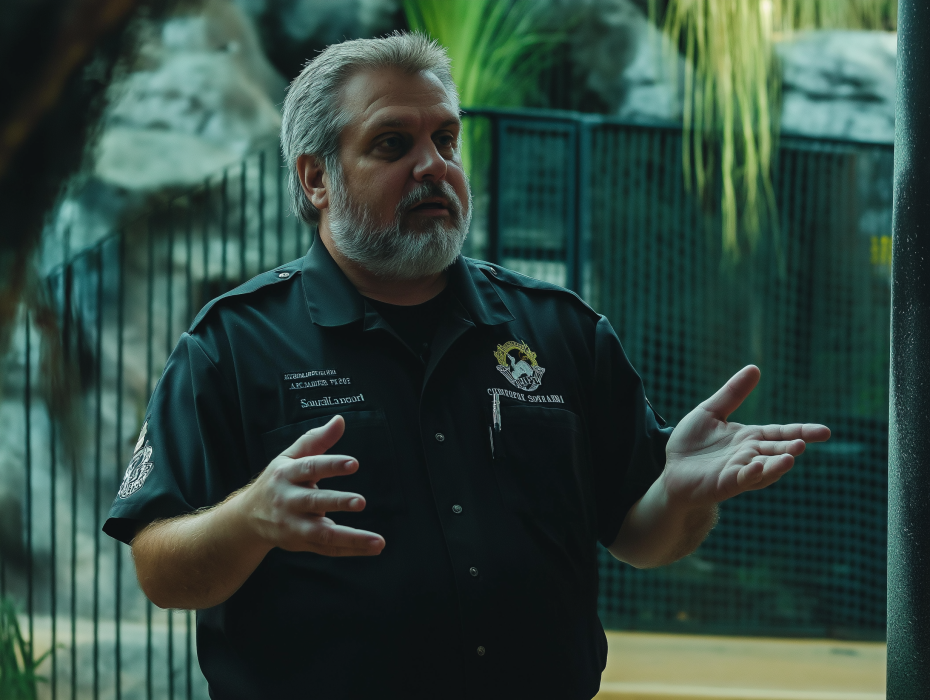
Daisy was oblivious to all the noise. She herded the cubs with practiced patience, curling them close when night settled. Zachary sometimes lingered past the end of his shift, crouching just beyond the barrier, watching the miraculous family. He felt both guardian and prisoner—entrusted with a miracle, chained to its looming fragility.
The media circled wider. Headlines screamed of miracles, while skeptics called it staged. Reporters begged for interviews. Zachary kept silent, unwilling to cheapen what he saw. Yet the attention only tightened the spotlight, amplifying every slip of claw or guttural growl into potential catastrophe. He carried the weight like a stone.
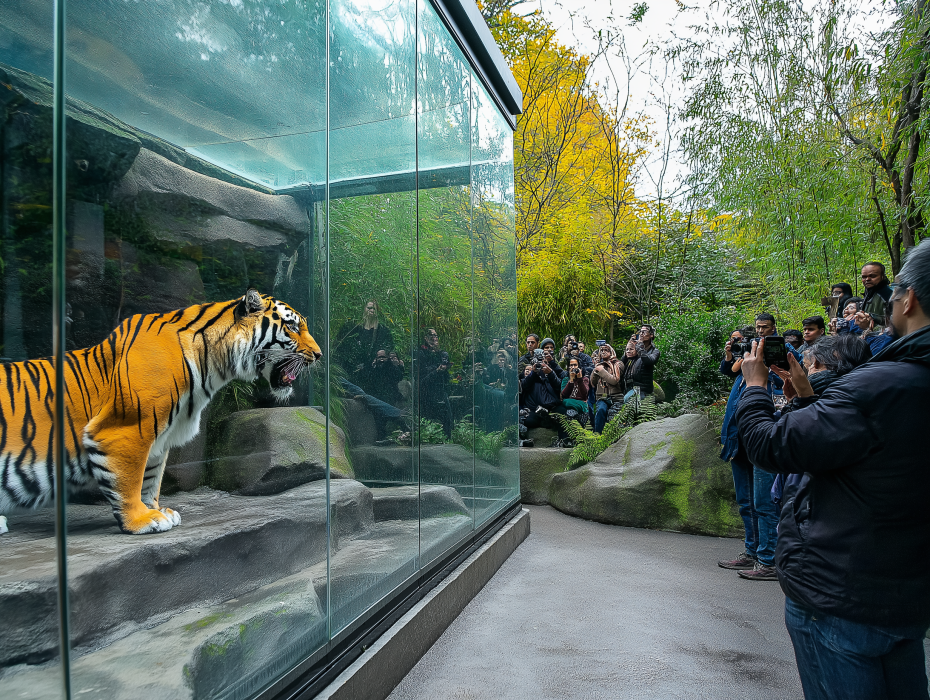
In quieter moments, Zachary wondered if Daisy understood what he couldn’t say aloud. That the days of peace were numbered, and that love could cradle instinct for only so long. Yet each time she curled around her brood, calm and defiant, he felt a flicker of hope stronger than his fear.
Zachary’s dread sharpened when Daisy stumbled after a rough play session. One cub had lunged too hard, knocking her sideways. She yelped, got up quickly, and resumed her steady watch, but Zachary’s hands shook long after. He realized the moment everyone feared was no longer distant, but circling close.
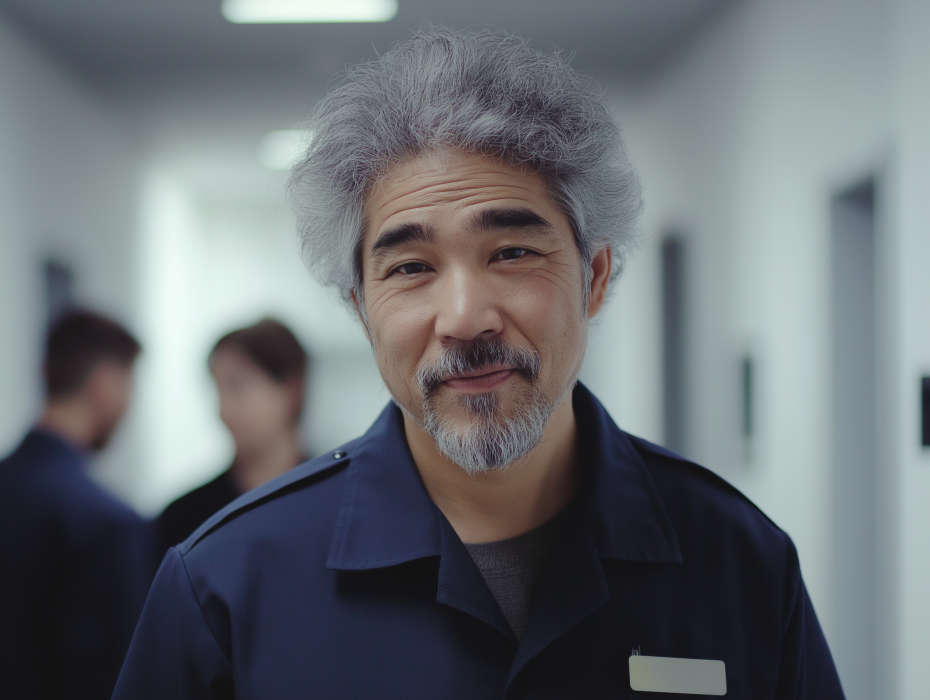
The other keepers avoided eye contact when they passed him in the corridors. He overheard them muttering: “He’s blinded by sentiment.” “When it turns ugly, it’ll be on him.” Their words stung because he half-believed them. Yet every time Daisy wagged her tail at him, his resolve not to separate her from her family deepened.
During feeding one afternoon, Zachary felt the shift. The cubs crowded the meat, low growls vibrating through the floor. Daisy wedged herself in, snapping until they backed off. Their eyes flicked with irritation. Visitors clapped at the “performance,” while Zachary tasted bile, knowing they had nearly crossed a line.
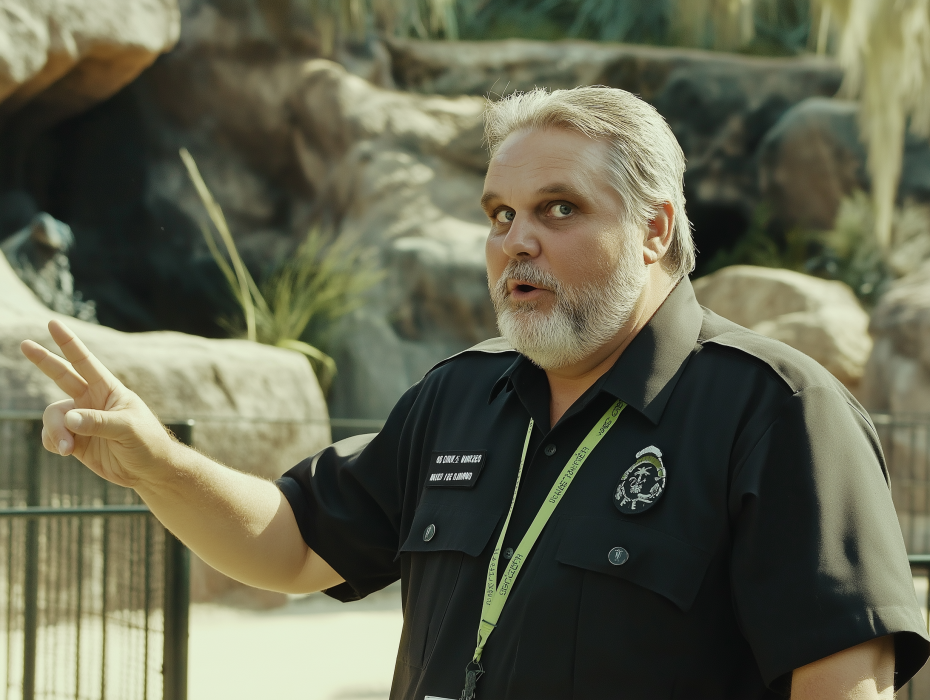
The director summoned him. “It’s gone on too long,” the man said, voice clipped. “One accident, one headline, and this zoo collapses. They must be separated.” Zachary’s throat tightened. He asked for time. The director shook his head. “Nature isn’t waiting. Neither are the insurance companies.” The decision was final.
When Zachary returned to the enclosure, Daisy bounded forward expectantly, cubs tumbling behind her. None of them knew what was coming. His chest ached as he crouched to stroke Daisy’s ears, memorizing her warmth. She licked his hand, tail wagging. He whispered, “I’m sorry,” though she couldn’t understand.
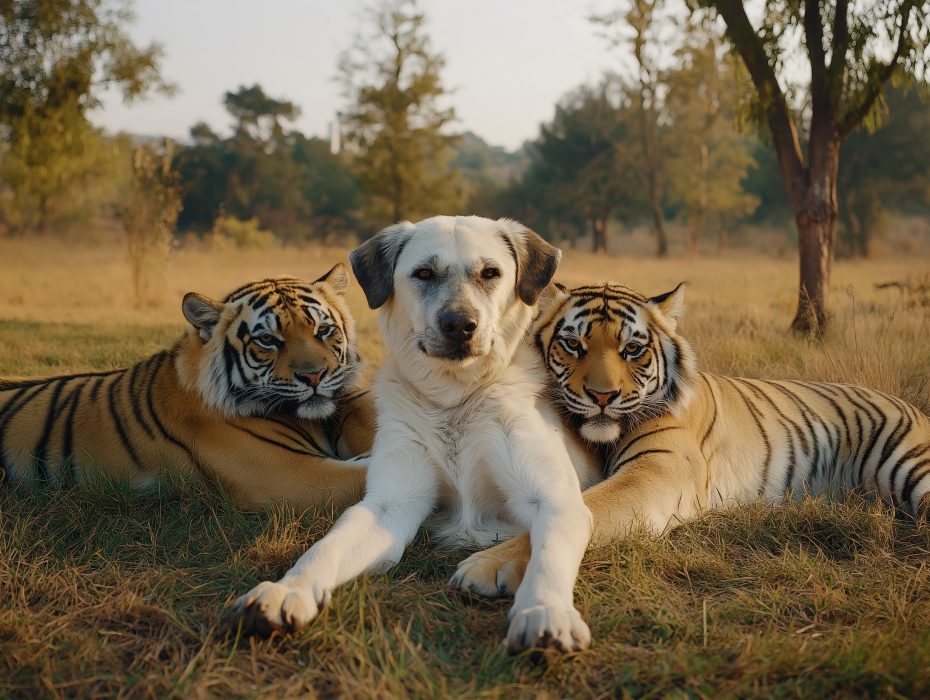
The night before the final separation, Zachary couldn’t sleep. He walked to the enclosure, rain misting his face. Daisy lay curled with the cubs, their striped bodies rising and falling against hers. The sight hollowed him out. He leaned against the glass, whispering, “Forgive me,” as if her steady breathing might answer.
The morning arrived with tension so thick it clung to the air. Staff stood ready with tranquilizer guns, restraints, and cages. Zachary hated every piece of equipment. Daisy barked in confusion when they led her away, straining at the leash. The cubs roared, slamming against the bars, desperate to follow.
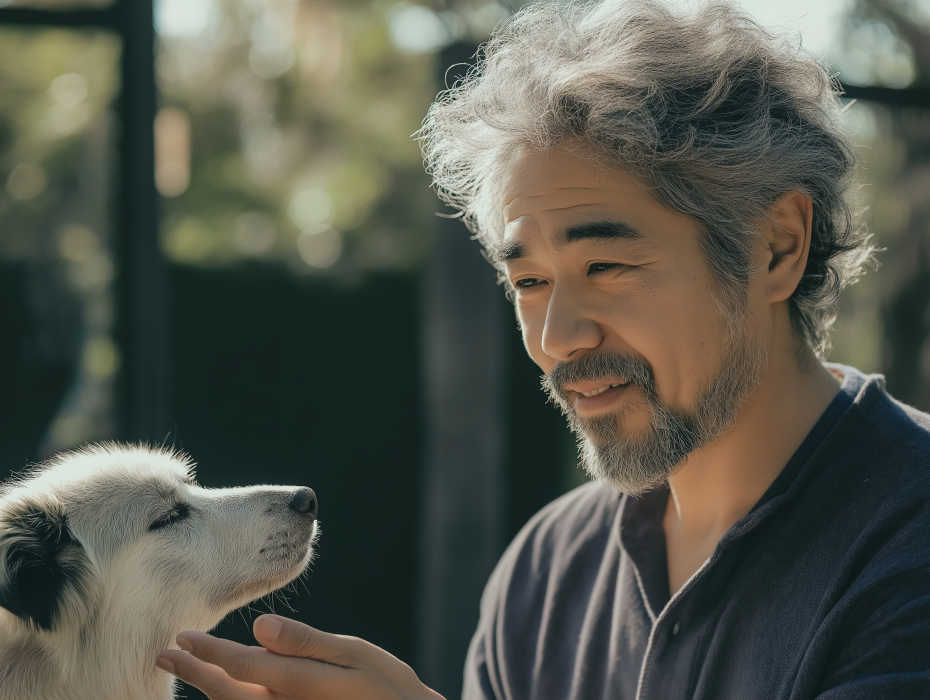
Zachary forced himself to walk beside Daisy, heart cracking with each step. He couldn’t look back at the cubs’ wild eyes, couldn’t bear their cries. Daisy pressed close, trembling but obedient. He whispered encouragement, voice breaking. And when the final barrier clanged shut between them, it sounded like betrayal made of steel.
That night, he walked the darkened zoo, Daisy padding at his side. The cubs pressed against the bars of their enclosure, restless, teeth flashing in the dim light. Daisy whined, wanting to join them. Zachary whispered, “Not tonight, Daisy.” The words felt hollow, like promises he had no power to keep.
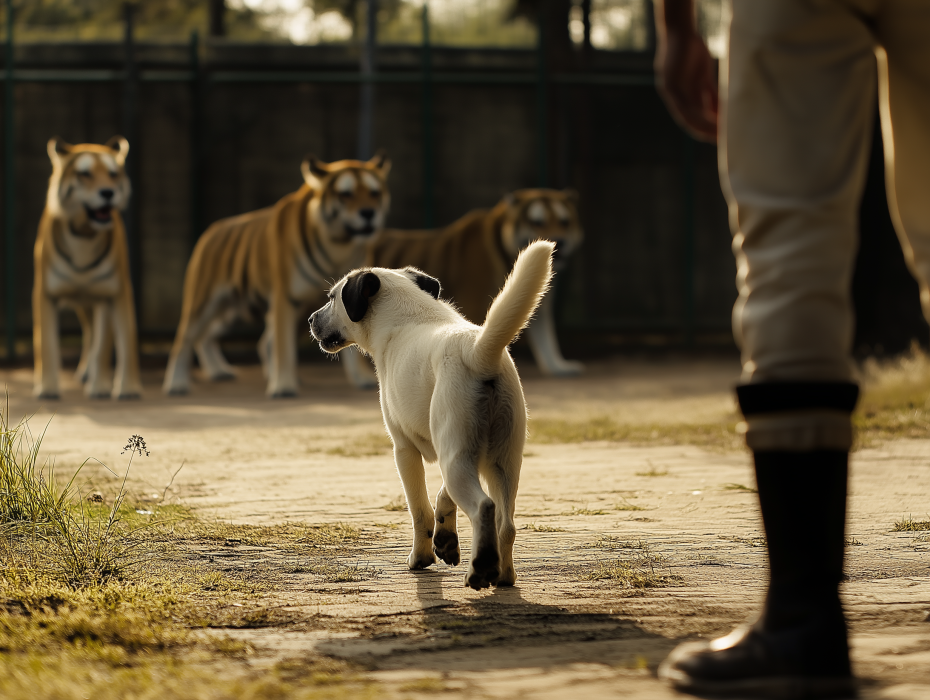
The zoo fell strangely quiet after the separation. Daisy lay in her kennel, ears flat, ignoring food. The cubs prowled their reinforced pen, pacing restless circles. Their roars echoed across the grounds like grief given voice. Zachary felt each sound cut into him, sharper than any reprimand.
At night, he walked the paths alone, listening to the unanswered calls. Daisy whimpered, the cubs thundered against steel, and the silence afterward tore him apart. He imagined them staring at the same stars, longing for what had been stolen. His guilt grew heavier than any chain.
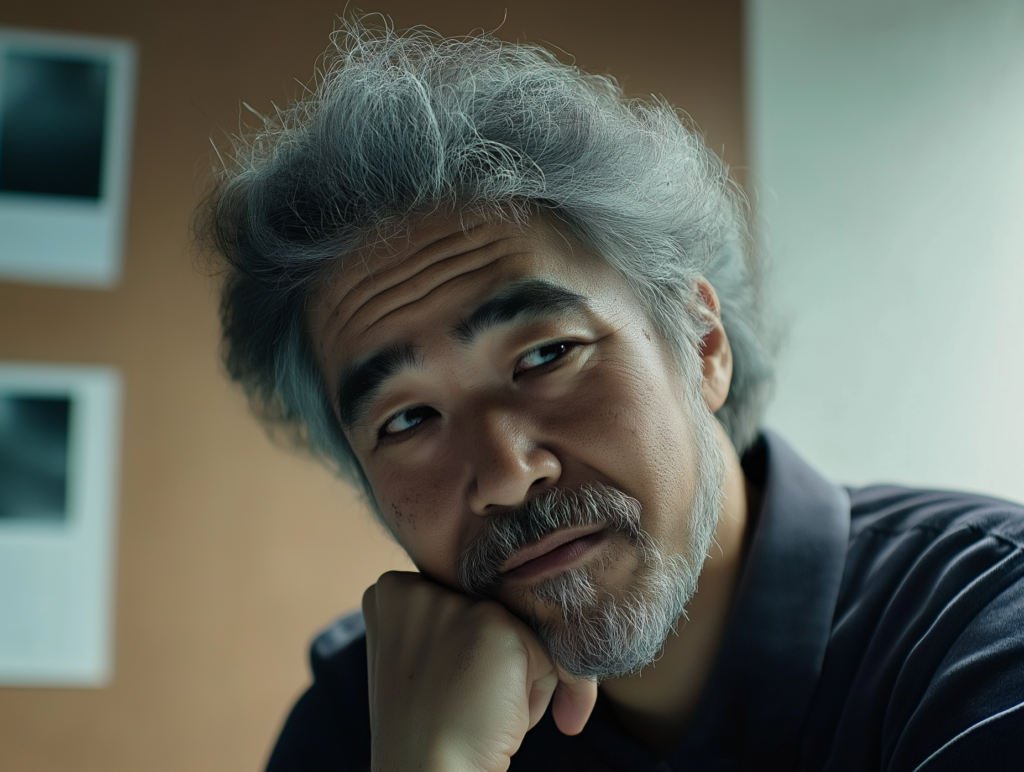
Visitors noticed the change. Families left disappointed, whispering that the miracle was over. Some demanded refunds, others muttered about cruelty. The director waved it off, insisting safety came first. Zachary watched the crowds dwindle, feeling as if he’d conspired to bury something extraordinary beneath bureaucratic concrete.
Daisy looked sadder than ever. Her once bright stride faltered into a limp, her coat dulling. She still searched the enclosures during walks, ears pricking at tiger roars, and tail wagging faintly. Each time, Zachary tugged her away, whispering apologies she couldn’t understand. Her eyes followed the sound long after.
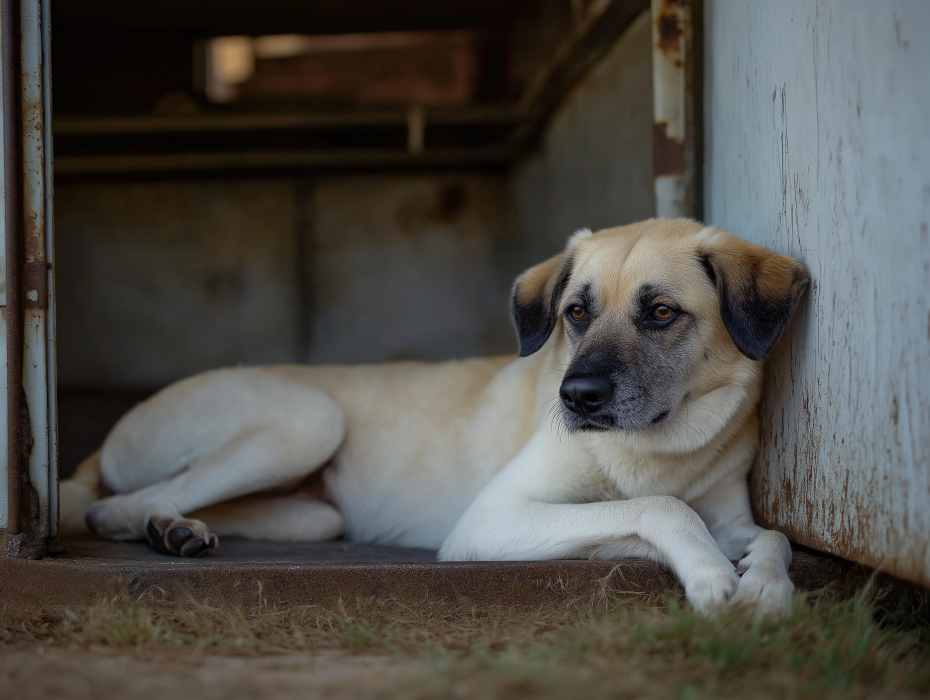
The cubs gradually became beasts. Their muscles rippled under striped coats, eyes hard and predatory. Keepers treated them with caution, avoiding direct contact. Yet every time Zachary entered the feeding corridor, the tigers pressed to the bars, sniffing, searching. He wondered if they still remembered Daisy or if their feline instinct had erased her.
Five years slipped by. Daisy seemed quieter. Though she ate and rested well, she had a more pronounced limp now. Zachary often sat beside her kennel, scratching her ears. In her presence, he never let others allude to the tigers. Whether she understood or not, the silence felt safer than reminding her of what was lost.
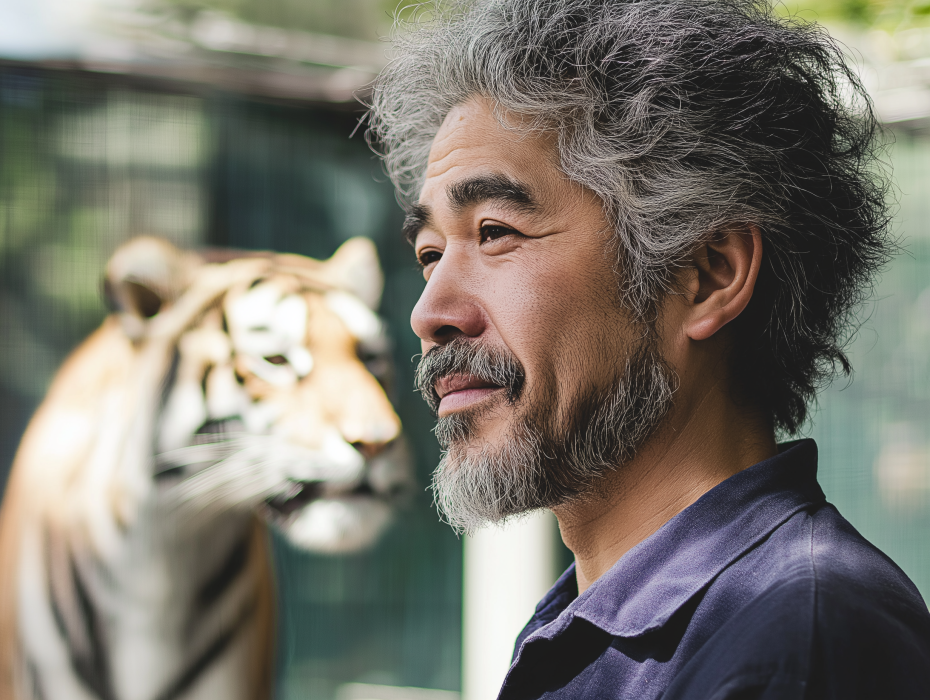
When he passed the tiger enclosure, Zachary noticed things others did not. A rumble in the throats of three when Daisy barked in the distance. The way their eyes tracked him longer than the rest of the staff. Shadows of memory flickered there, but he refused to trust them. After all, they were feral.
The tigers’ roars grew sharper as the months dragged on, echoing across the grounds like accusations. Zachary flinched each time, hearing not menace but longing. Staff dismissed it as hunger or aggression, but he knew better. They were still calling for her, though years had stretched the distance.
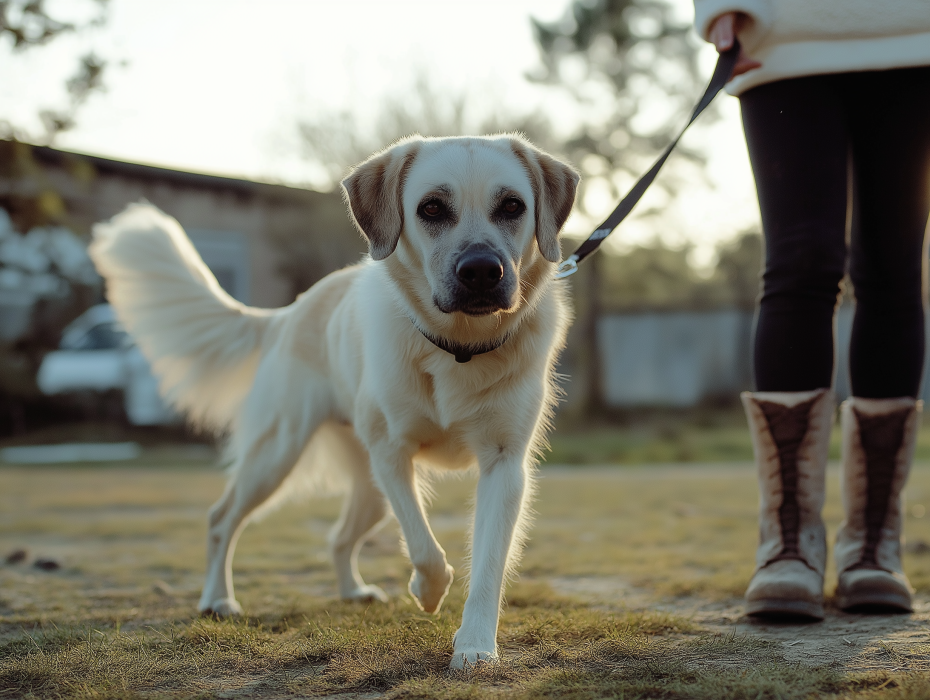
Daisy too carried her grief. She often pulled against the leash on their walks, nose twitching toward the tiger enclosures. When Zachary tugged her away, she looked back over her shoulder, eyes wide, tail wagging uncertainly. It broke him every time. He knew that she remembered. She always remembered.
Other keepers spoke openly now. “They’re dangerous, unpredictable. Best to start fresh with a new breeding program.” Zachary sat in silence, anger caged in his chest. They spoke of the tigers as problems, statistics, not as creatures who once curled against Daisy’s fur like helpless children.
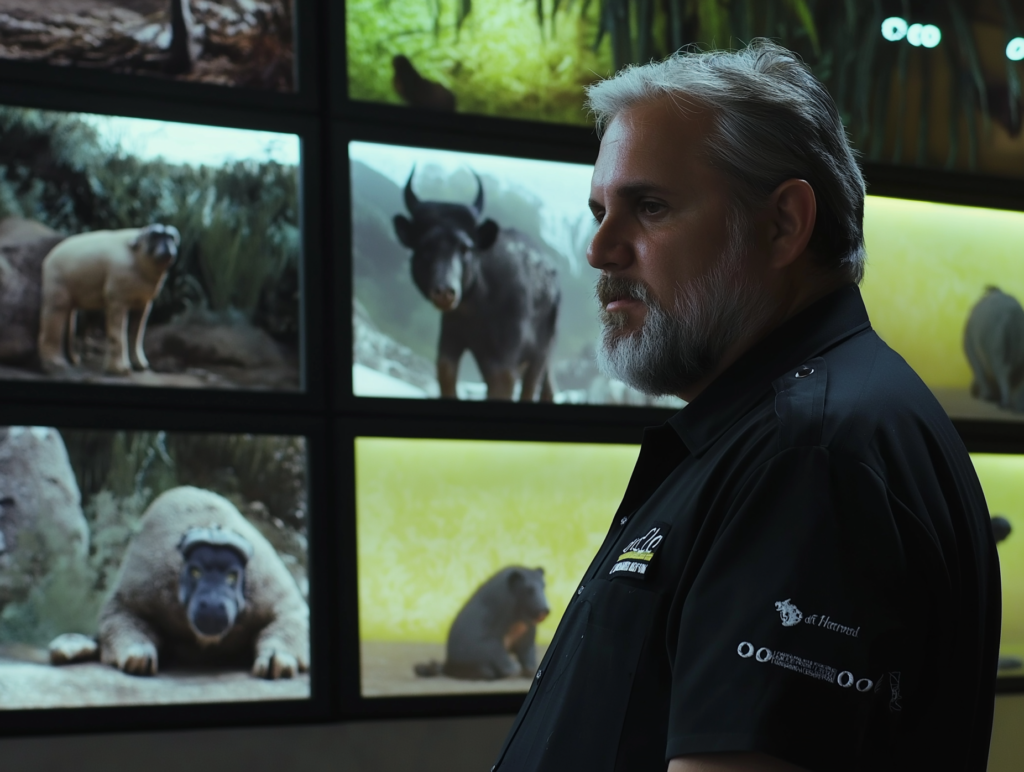
The director remained pragmatic. “The experiment served its purpose. It drew crowds and headlines. But sentimentality has no place here. Tigers must be treated as tigers.” Zachary knew that it was logical, but still, he often felt a twitch of irritation. They didn’t understand. They never had. Only Daisy had ever truly known.
At night, Zachary stayed longer, watching Daisy sleep. Her paws twitched with dreams, as though chasing something just out of reach. He imagined she dreamed of them—her cubs, her lost children. He wondered if she blamed him. He wondered if someday she would look at him and see only betrayal.
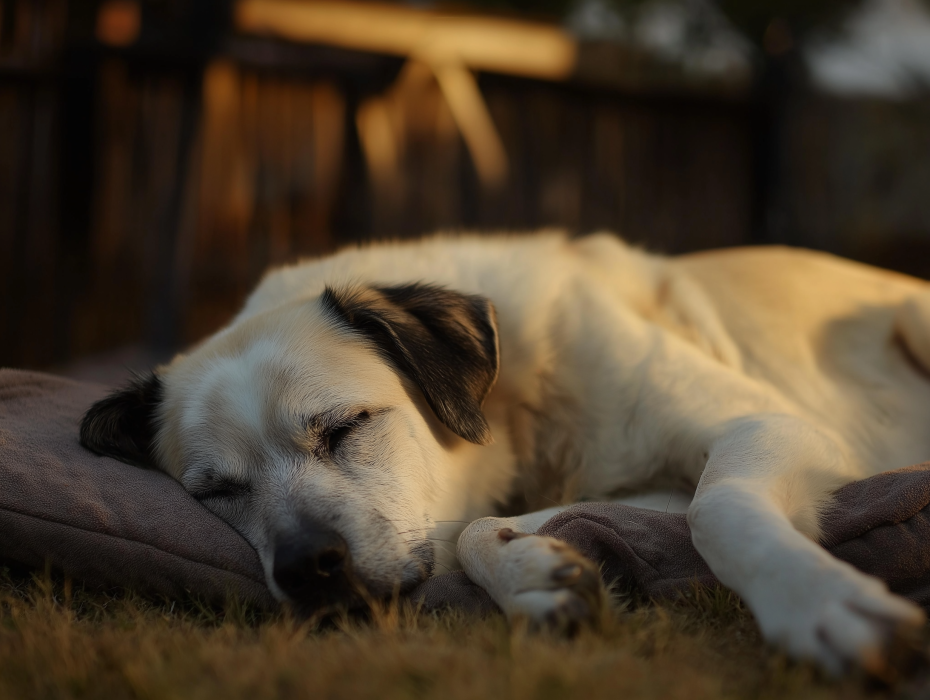
Meanwhile, the zoo’s popularity waned. Without Daisy and the cubs together, it lost its wonder. Crowds thinned, media moved on. Zachary felt strangely relieved. The less the spectacle, the less the scrutiny. Yet it left a void, too. As though their story, once alive, was now being erased, leaving only ache and silence behind.
One evening, Daisy collapsed after a short walk. Panic seized Zachary as he knelt beside her, heart hammering. She rose again, shaky but determined, leaning against his leg. He stroked her thinning fur, whispering promises. He swore he wouldn’t let her fade without knowing she had mattered.
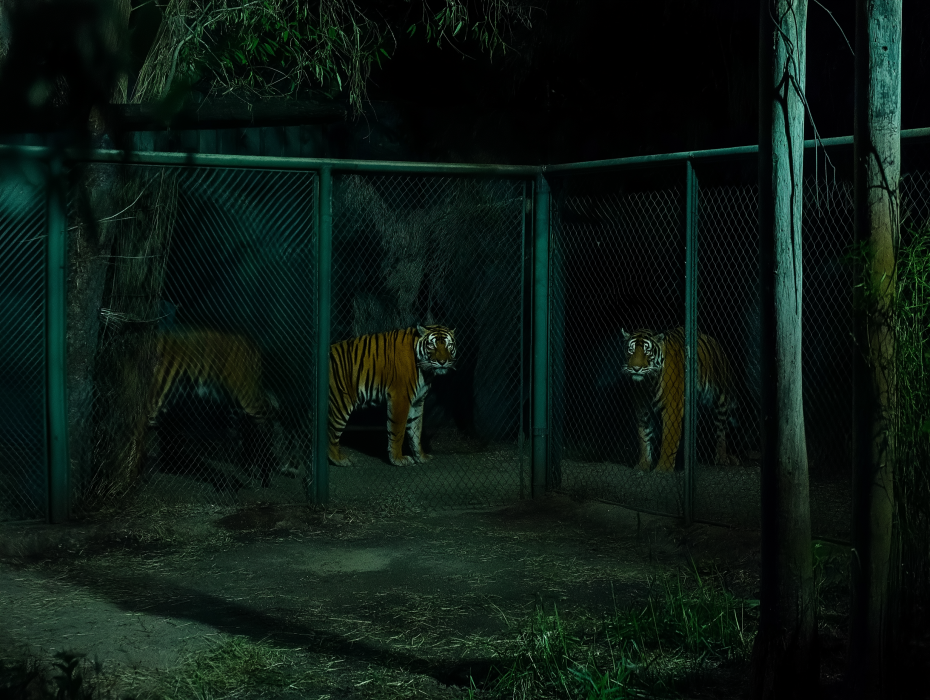
As stars lit the night, Zachary lingered at the tiger enclosure. They prowled the shadows, eyes glinting like coals. Somewhere deep inside, he felt the story wasn’t finished. He didn’t know when or how, but the air carried a charge, a whisper. One day, something would break.
The warnings began subtly—keepers whispered of restlessness, pacing, and aggression in the tiger enclosure. Zachary dismissed the rumors at first, but he saw it too. The animals that once nuzzled Daisy now prowled with a disquiet that unsettled him. Their roars sounded less like longing, more like demand.
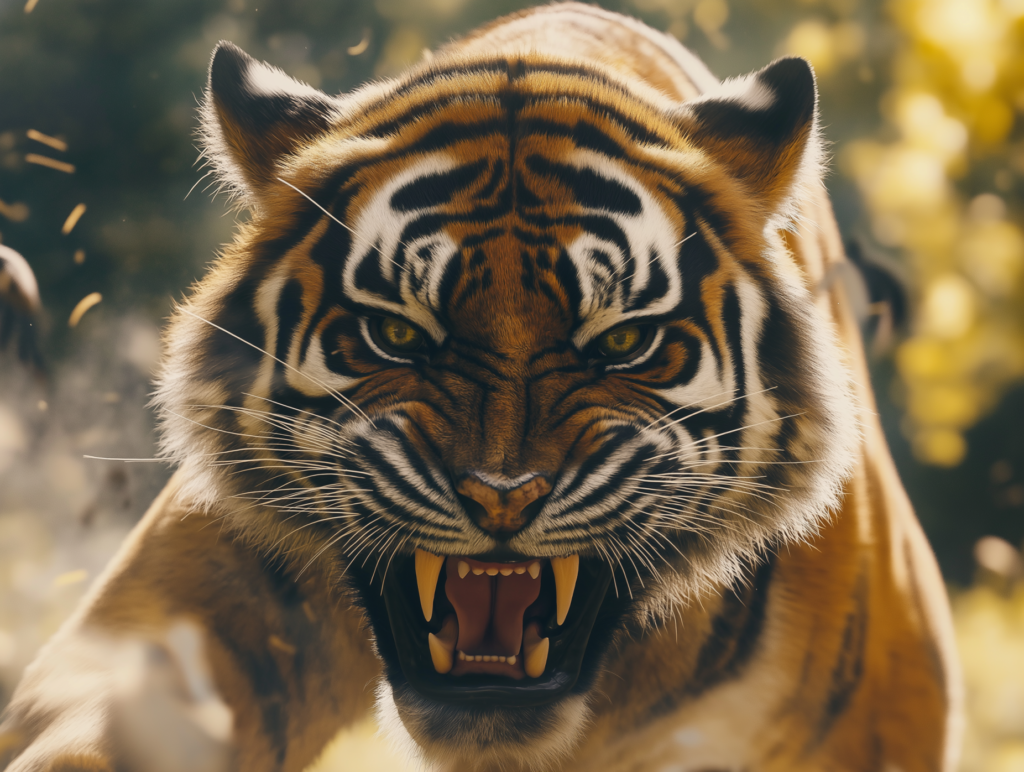
Then came the incident. A young trainer stepped too close during feeding, and a tiger swiped, claws raking the air inches from his face. He stumbled back pale, shaken. The director seized on it instantly. He told the staff. “We may need to transfer one or two. They’re becoming more than our staff can handle.” Zachary’s stomach dropped.
The media caught wind. Headlines flared: “Tigers Too Dangerous?” “Zoo Miracle Turning Deadly?” Protesters gathered outside the gates, signs waving, chanting about cruelty and danger. Zachary avoided cameras, burying himself in chores, his face drawn. Every roar from the enclosure now seemed amplified, feeding the storm surrounding them.
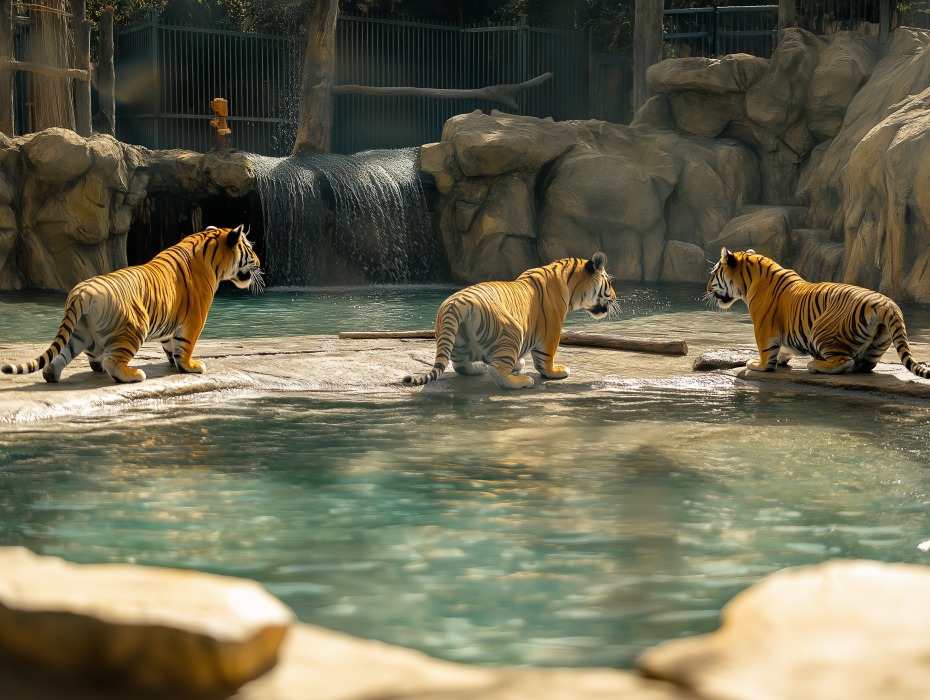
Night after night, he walked the grounds, pausing at the tiger enclosure. Their eyes gleamed through the bars, following him with unsettling focus. He stood there, breath clouding in the cold air, and felt the weight of inevitability pressing in. Something was coming. He couldn’t decide if it was mercy or doom.
Staff became wary, tension thick as chains. They moved cautiously, avoiding direct eye contact with the cats, voices hushed. Yet Zachary noticed a difference: when Daisy barked faintly in the distance, the tigers’ ears flicked, their pacing slowed. Memory lingered. He clung to that shred like a drowning man to driftwood.
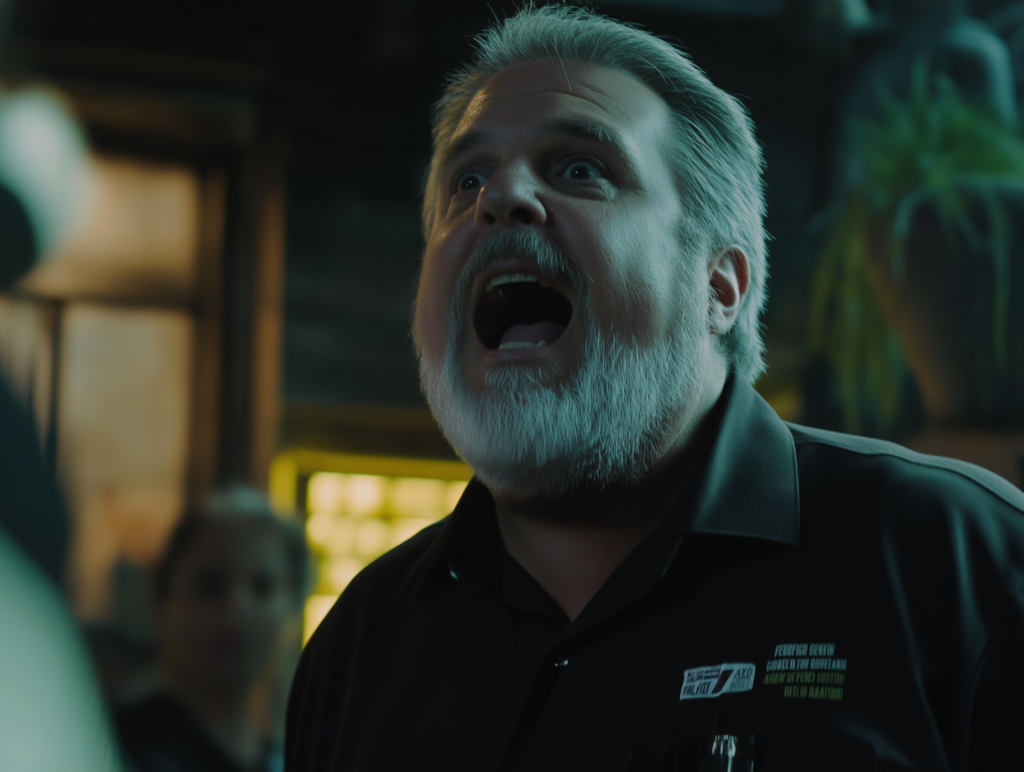
The director’s patience thinned. “We can’t keep them all like this,” he told Zachary flatly. “One more slip and headlines will destroy us. Be prepared.” Zachary nodded stiffly, but inside he burned. To him, the danger wasn’t proof of failure. It was proof that something unresolved still bound them together.
Visitors returned in trickles, drawn by rumors of unrest. They pressed close to the enclosure, gasping at the tigers’ size, at their restless pacing. Parents pulled their children back nervously. Zachary overheard one boy whisper, “Do you think they still remember the dog?” He bit his tongue hard to keep from answering.
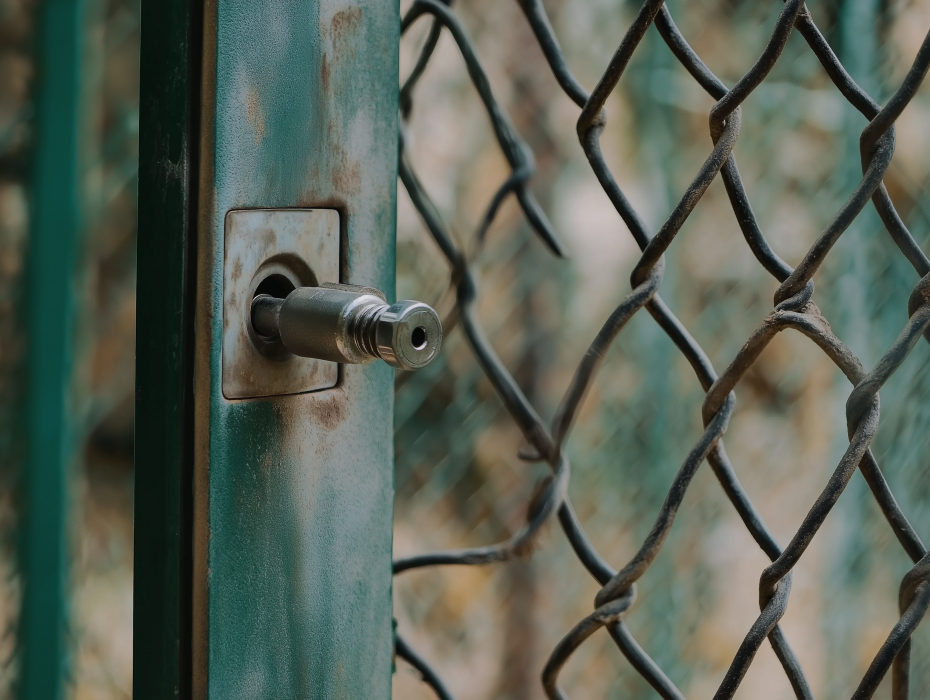
The storm hit on a Thursday, rattling the zoo with wind that shook fences and toppled branches. Power flickered, alarms buzzed, and somewhere in the chaos, a latch failed. Zachary arrived at the tiger enclosure to find keepers shouting, lights flashing. One gate hung open. His blood froze.
One of the massive tigers prowled loose in the corridor, muscles rippling, eyes blazing with confusion. Staff scrambled, tranquilizer rifles trembling in their hands. The director barked orders. Zachary’s chest clenched with terror—not for himself, but for what this would mean. One wrong move, and the animals would never survive.
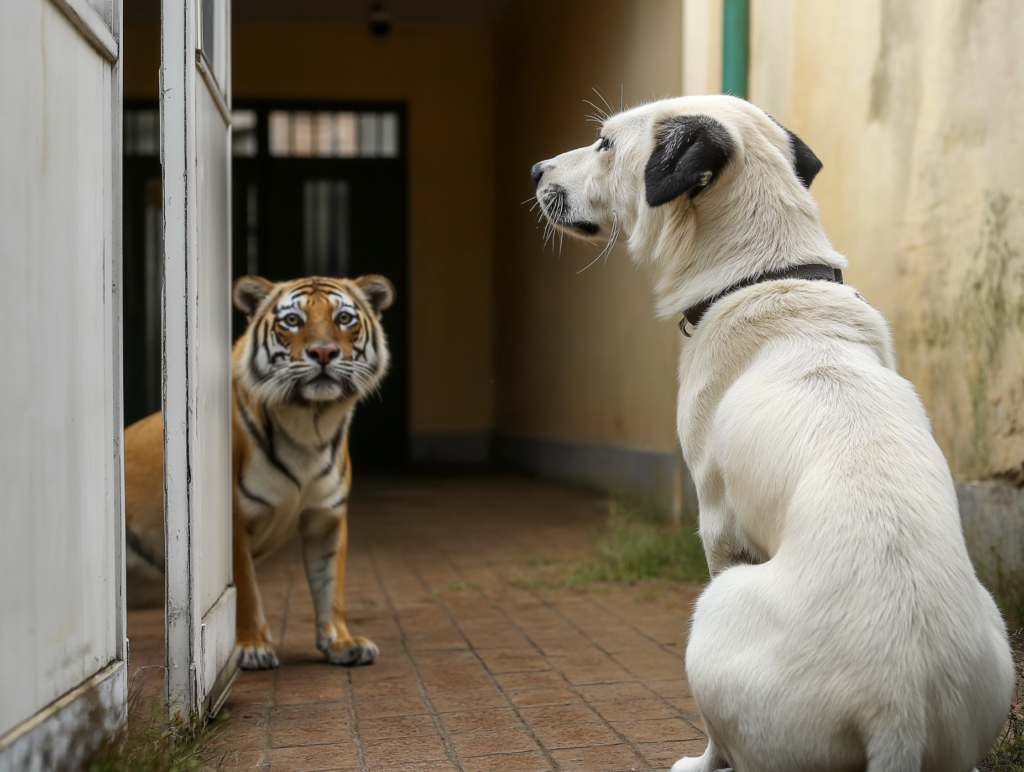
Before he could react, a bark split the din. Daisy, slower with age but still fierce, had slipped free from her kennel. She trotted into view, tail stiff, ears pricked, ignoring Zachary’s desperate cry. Gasps rippled through the staff as she padded toward the loose tiger.
Zachary’s heart hammered. Every instinct screamed disaster. The tiger lowered its body, muscles coiled, jaws parting. Staff raised rifles, fingers tight on triggers. Zachary shouted, “Don’t shoot!” His voice cracked, torn between authority and pleading. The scene hung suspended—dog, tiger, and humans frozen in one impossible tableau.
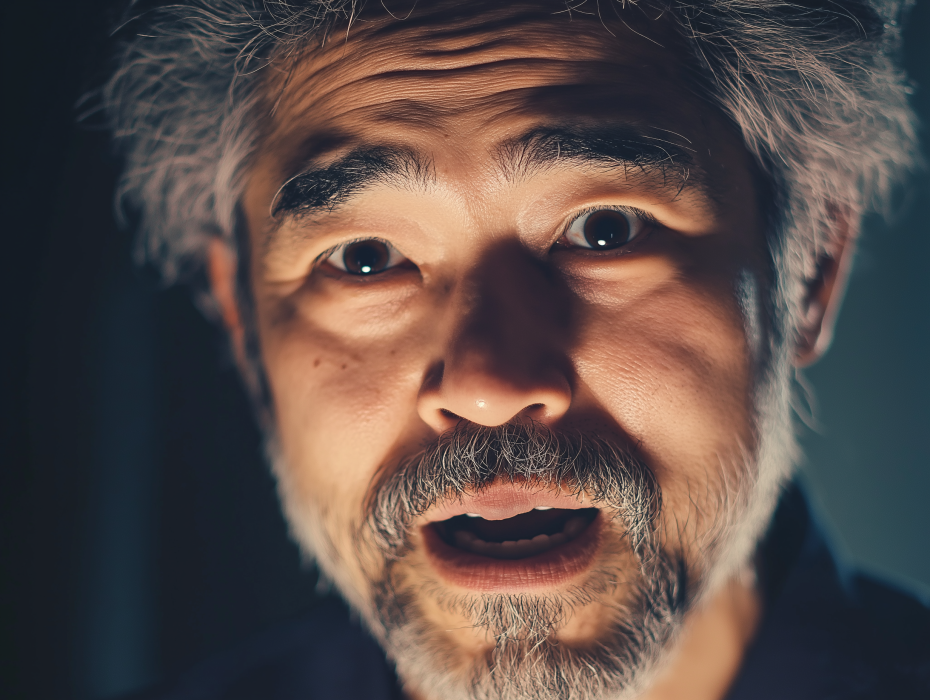
Then, the impossible unfolded. The tiger let out a low, rumbling sound, which was neither a roar, nor a growl, but something deeper. Daisy wagged her tail, stepping closer, nose twitching. The massive cat lowered its head, pressing its muzzle against her side. The rifles wavered. Someone behind Zachary sobbed.
The other tigers roared from within their enclosure, claws raking metal. Staff panicked, thinking an attack was imminent. But when the gates swung fully, they surged out only to surround Daisy. They circled her, brushing against her, chuffing like oversized kittens. Zachary’s vision blurred as tears flowed.
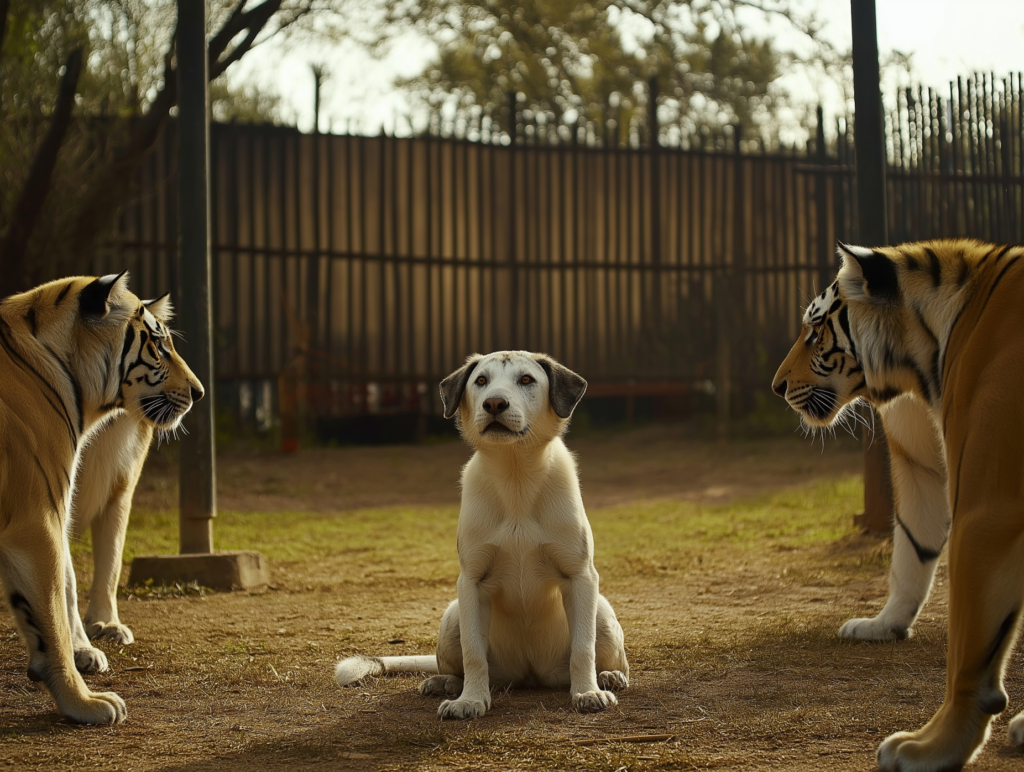
The director whispered, “Unbelievable,” but Zachary barely heard. He only saw Daisy—tail wagging, licking muzzles as if greeting long-lost children. Five years of separation, but nothing had shattered the bond. Against every prediction, instinct bent beneath memory. The miracle lived, raw and undeniable. The zoo’s chaos stilled into reverent silence.
Daisy curled among them as if no time had passed. The tigers settled beside her, purring vibrations that shook the ground. Zachary wiped his face, overwhelmed. He had doubted, feared, and perhaps, even betrayed them by enforcing separation. Yet here they were together again, writing a story beyond science or reason.
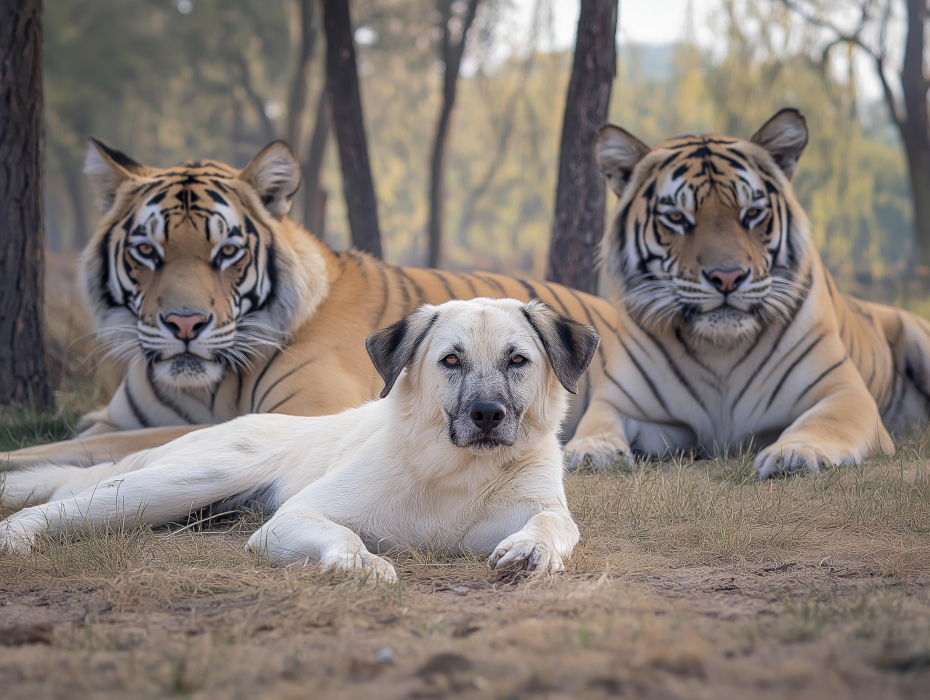
That night, as the zoo lights dimmed and the crowd dispersed, Zachary stayed behind. Daisy slept nestled between the giants she had raised, their stripes glowing in the moonlight. He stood at the glass, tears drying on his cheeks, whispering, “You never forgot.” And for once, he believed in miracles.
When morning light spilled across the zoo, the keepers found Daisy resting just outside the enclosure, the tigers pressed close against the bars as if unwilling to part. No drama marked the separation this time. It was gentle and inevitable, like the closing of a chapter written long ago.
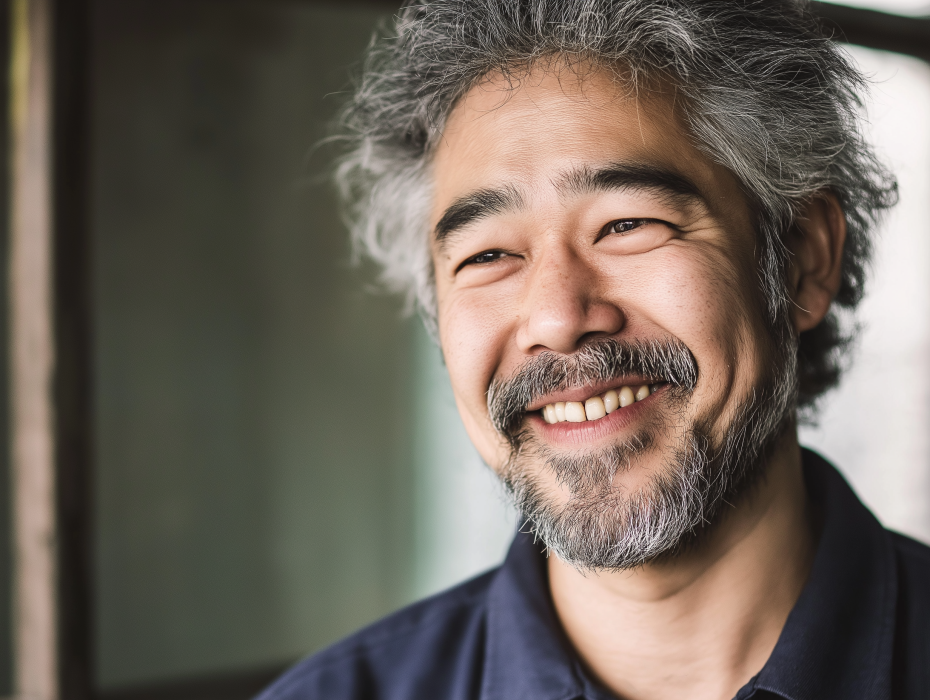
Within weeks, Daisy’s strength waned for good. One evening, she lay down and did not rise again. Zachary knelt beside her, tears tracing his cheeks, but her face was calm. It was as though she had been waiting, holding on until she could see her children once more, then letting go.
